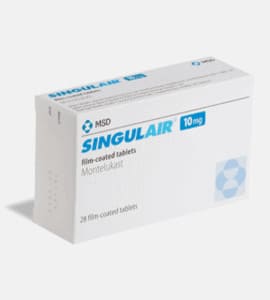

Not in stock

Common use
Singulair is a leukotriene (loo-Koe-TRY-een) inhibitor which used for the treatment of asthma, the prevention of exercise-induced asthma, and allergic rhinitis (sneezing, stuffy nose, runny nose, itching of the nose, and outdoor and indoor allergies). Singulair blocks substances in the body called leukotrienes, which cause asthma and allergic rhinitis.
Dosage and
directions
You will get the best result using it every day. Swallow the tablet whole with a glass of water/milk. If you are taking the chewable tablet, the tablet must be chewed before swallowing. The recommended dose for adults and children 15 years and over is 10 mg a day. For children ages 6 to 14 years old, the recommended dose is 5 mg, taken once daily. For young children 2 to 5 years old, the recommended dose is 4 mg, taken once daily. For children age 6 to 23 months old, the recommended dose is one packet of oral granules (4 mg), taken once daily. This drug should be taken once daily in the evening. Also, we would like to inform you that safety and effectiveness in pediatric patients less than 12 months of age have not been established. Note: this instruction presented here just for review. It's very necessary to consult with your doctor before using. It helps you to get the best results.
Precautions
Singulair Should not be used for the treatment of acute asthma attacks. Singulair Should not be abrupt substituted for inhaled or oral corticosteroids. Pregnancy & lactation. Children are greater than/above 6 years. Warning that if you have asthma and if your asthma is made worse by aspirin, continue to avoid aspirin or other medicines called nonsteroidal anti-inflammatory drugs while taking Singulair.
Contraindications
Not allowed in patients with known hypersensitivity to any component of this product.
Possible
side effect
They may include an allergic reaction: hives; difficulty breathing; swelling of your face, lips, tongue, or throat. Also, the most possible side effects include: skin rash, bruising, severe tingling, numbness, pain, muscle weakness; mood or behaviour changes, anxiety, depression, or thoughts about suicide or hurting yourself; tremors or shaking; severe sinus pain, swelling, or irritation; or worsening asthma symptoms. Less serious include: headache; stomach pain, heartburn, upset stomach, nausea, diarrhoea; tooth pain; tired feeling; fever, stuffy nose, sore throat, cough, hoarseness; or mild rash. If you experience one of them stop using Singulair and tell your doctor as soon as possible. Also, consult with your doctor about any side effect that seems unusual.
Drug
interactions
Singulair interact with the following medicines: cisapride; methscopolamine nitrate; nitrates like amyl nitrite, isosorbide dinitrate, isosorbide mononitrate, nitroglycerin; nitroprusside; other sildenafil products. Also, this medicine interact with: certain drugs for high blood pressure; certain drugs for the treatment of HIV infection or AIDS; certain drugs used for fungal or yeast infections, like fluconazole, itraconazole, ketoconazole, and voriconazole; cimetidine; erythromycin; rifampin. Also, note that interaction between two medications does not always mean that you must stop taking one of them. As usual, it affects the effect of drugs, so consult with your doctor about how it interactions are being managed or should be managed.
Missed dose
If you forgot to take your dose in time, please do it as soon as you remember. But do not take if it is too late or almost time for your next dose. Do not increase your recommended dose. Take your usual dose next day in the same regularly time.
Overdose
If you take more dose you need in a long period of time it can lead to such symptoms as thirst, drowsiness, dilated pupils, increased muscle movements, or severe stomach pain. If you experience one of them call your doctor immediately.
Storage
Store at
room temperature between 59-77 degrees F (15-25 degrees C) away from light and
moisture, kids and pets. Do not use after expiration term.


Last updated: 17.12.2024